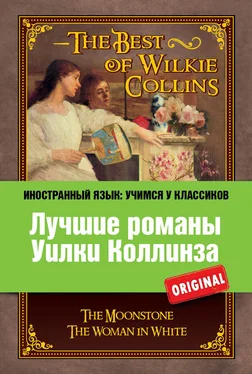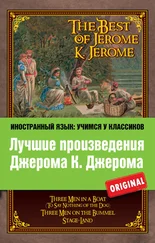I settled it with myself, when she was gone, that I really would ask Mr. Franklin – mainly to set Penelope’s mind at rest. What was said between us, when I did ask him, later on that same day, you will find set out fully in its proper place. But as I don’t wish to raise your expectations and then disappoint them, I will take leave to warn you here – before we go any further – that you won’t find the ghost of a joke in our conversation on the subject of the jugglers. To my great surprise, Mr. Franklin, like Penelope, took the thing seriously. How seriously, you will understand, when I tell you that, in his opinion, “It” meant the Moonstone.
I am truly sorry to detain you over me and my beehive chair. A sleepy old man, in a sunny back yard, is not an interesting object, I am well aware. But things must be put down in their places, as things actually happened – and you must please to jog on a little while longer with me, in expectation of Mr. Franklin Blake’s arrival later in the day.
Before I had time to doze off again, after my daughter Penelope had left me, I was disturbed by a rattling of plates and dishes in the servants’ hall, which meant that dinner was ready. Taking my own meals in my own sitting-room, I had nothing to do with the servants’ dinner, except to wish them a good stomach to it all round, previous to composing myself once more in my chair. I was just stretching my legs, when out bounced another woman on me. Not my daughter again; only Nancy, the kitchen-maid, this time. I was straight in her way out; and I observed, as she asked me to let her by, that she had a sulky face – a thing which, as head of the servants, I never allow, on principle, to pass me without inquiry.
“What are you turning your back on your dinner for?” I asked. “What’s wrong now, Nancy?”
Nancy tried to push by, without answering; upon which I rose up, and took her by the ear. She is a nice plump young lass, and it is customary with me to adopt that manner of showing that I personally approve of a girl.
“What’s wrong now?” I said once more.
“Rosanna’s late again for dinner,” says Nancy. “And I’m sent to fetch her in. All the hard work falls on my shoulders in this house. Let me alone, Mr. Betteredge!”
The person here mentioned as Rosanna was our second housemaid. Having a kind of pity for our second housemaid (why, you shall presently know), and seeing in Nancy’s face, that she would fetch her fellow-servant in with more hard words than might be needful under the circumstances, it struck me that I had nothing particular to do, and that I might as well fetch Rosanna myself; giving her a hint to be punctual in future, which I knew she would take kindly from ME.
“Where is Rosanna?” I inquired.
“At the sands, of course!” says Nancy, with a toss of her head. “She had another of her fainting fits this morning, and she asked to go out and get a breath of fresh air. I have no patience with her!”
“Go back to your dinner, my girl,” I said. “I have patience with her, and I’ll fetch her in.”
Nancy (who has a fine appetite) looked pleased. When she looks pleased, she looks nice. When she looks nice, I chuck her under the chin. It isn’t immorality – it’s only habit.
Well, I took my stick, and set off for the sands.
No! it won’t do to set off yet. I am sorry again to detain you; but you really must hear the story of the sands, and the story of Rosanna – for this reason, that the matter of the Diamond touches them both nearly. How hard I try to get on with my statement without stopping by the way, and how badly I succeed! But, there! – Persons and Things do turn up so vexatiously in this life, and will in a manner insist on being noticed. Let us take it easy, and let us take it short; we shall be in the thick of the mystery soon, I promise you!
Rosanna (to put the Person before the Thing, which is but common politeness) was the only new servant in our house. About four months before the time I am writing of, my lady had been in London, and had gone over a Reformatory [17], intended to save forlorn women from drifting back into bad ways, after they had got released from prison. The matron, seeing my lady took an interest in the place, pointed out a girl to her, named Rosanna Spearman, and told her a most miserable story, which I haven’t the heart to repeat here; for I don’t like to be made wretched without any use, and no more do you. The upshot of it was, that Rosanna Spearman had been a thief, and not being of the sort that get up Companies in the City, and rob from thousands, instead of only robbing from one, the law laid hold of her, and the prison and the reformatory followed the lead of the law. The matron’s opinion of Rosanna was (in spite of what she had done) that the girl was one in a thousand, and that she only wanted a chance to prove herself worthy of any Christian woman’s interest in her. My lady (being a Christian woman, if ever there was one yet) said to the matron, upon that, “Rosanna Spearman shall have her chance, in my service.” In a week afterwards, Rosanna Spearman entered this establishment as our second housemaid.
Not a soul was told the girl’s story, excepting Miss Rachel and me. My lady, doing me the honour to consult me about most things, consulted me about Rosanna. Having fallen a good deal latterly into the late Sir John’s way of always agreeing with my lady, I agreed with her heartily about Rosanna Spearman.
A fairer chance no girl could have had than was given to this poor girl of ours. None of the servants could cast her past life in her teeth, for none of the servants knew what it had been. She had her wages and her privileges, like the rest of them; and every now and then a friendly word from my lady, in private, to encourage her. In return, she showed herself, I am bound to say, well worthy of the kind treatment bestowed upon her. Though far from strong, and troubled occasionally with those fainting-fits already mentioned, she went about her work modestly and uncomplainingly, doing it carefully, and doing it well. But, somehow, she failed to make friends among the other women servants, excepting my daughter Penelope, who was always kind to Rosanna, though never intimate with her.
I hardly know what the girl did to offend them. There was certainly no beauty about her to make the others envious; she was the plainest woman in the house, with the additional misfortune of having one shoulder bigger than the other. What the servants chiefly resented, I think, was her silent tongue and her solitary ways. She read or worked in leisure hours when the rest gossiped. And when it came to her turn to go out, nine times out of ten she quietly put on her bonnet, and had her turn by herself. She never quarrelled, she never took offence; she only kept a certain distance, obstinately and civilly, between the rest of them and herself. Add to this that, plain as she was, there was just a dash of something that wasn’t like a housemaid, and that WAS like a lady, about her. It might have been in her voice, or it might have been in her face. All I can say is, that the other women pounced on it like lightning the first day she came into the house, and said (which was most unjust) that Rosanna Spearman gave herself airs.
Having now told the story of Rosanna, I have only to notice one of the many queer ways of this strange girl to get on next to the story of the sands.
Our house is high up on the Yorkshire coast, and close by the sea. We have got beautiful walks all round us, in every direction but one. That one I acknowledge to be a horrid walk. It leads, for a quarter of a mile, through a melancholy plantation of firs, and brings you out between low cliffs on the loneliest and ugliest little bay on all our coast.
Читать дальше
Конец ознакомительного отрывка
Купить книгу












